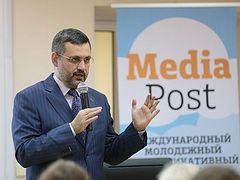Recently some Russian media reprinted a six-year-old fake news story that a group of believers headed by an Orthodox priest from Taganrog [a city in the Rostov region, southern Russia] allegedly pushed for banning the Russian version of the Pinnochio tale, Buratino[1] and recognizing it as extremist. Earlier another fake news story had rapidly spread on our social media: according to it, the Russian Orthodox Church received a license from the Bank of Russia and was going to offer loans to the population.
We talked with Michael Khasminsky, Director of the Center for Crisis Psychology at the Patriarchal Church of the Resurrection of Christ in Moscow, on why fake news about the Church are in high demand among some mass media.
—Why is fake news about the Church so popular among some Russian media and their readers?
—Unfortunately, many media companies profit from skillfully spun fake news, lies and falsehoods. Firstly, they cater to certain traits of human psychology that reveal themselves here. Extraordinary, disastrous and bad events always tend to attract people’s interest. Thus, some media deliberately make use of this negative human trait. Once news that characterizes somebody negatively has appeared, people begin to judge this person and feel superior to him. They like it. Secondly, it attracts people’s attention to the periodical, improves its rating, and serves promotional purposes. The more false information (which on its face sounds “plausible”) you give, the more effective your commercial activity.
These are the economic effects of fake news. But when it comes to misinformation as part of the war continually waged against the Church, it appears that making fake news is a very effective instrument as well. Somebody publishes an outright lie, but this information arouses strong emotions and spreads much faster than truth. According to different research, it is the first news on one or another theme that stays in people’s memories for a long time and is distributed with lightning speed. It applies even to transparent lies. No matter how many times you publish a disclaimer afterwards, the disclaimer itself will reach very few people.
—It reminds me of the famous joke: “True, it was not you that stole this thing. It’s that you left a bad taste in my mouth”…
—Exactly. Most people are not critical, they are not specialists, and they can’t understand every subtle nuance relevant to one or another piece of news. So, they believe fake news and the provocation “hits its target” by successfully discrediting the Church. And you can concoct as many fake stories as you wish, as long as readers remain low-level “information consumers” (and they have become just that with the help of these media outlets).
Unfortunately, Orthodox people are often naïve too—even extremely naïve. And some mass media take advantage of their (Orthodox people’s) credulity by waging their war against the Church and discrediting the patriarch and the higher clergy.
—What do you mean when you state that a war is being waged against the Church?
—Some forces are delivering these blows because they want as few people with constructive worldviews as possible. They have been utilizing ancient techniques of psychological warfare that were developed many centuries ago—for example, the military strategies attributed to the Chinese military general Sun Tzu. They adapt them to our time and find suitable “mouthpieces” who voice their ideas.
If you cannot defeat somebody physically, you can change his worldview. Once he has become mentally vulnerable, there is no need to defeat him any more—he is already yours. This war is being waged at a mental level, and this war has never stopped.
—Do you think that the current surge of false news is a special campaign, or do they spring up spontaneously because of the widespread misconceptions about the Church?
—I believe that sometimes it is a campaign and sometimes it is guided by commercial interests and the quest for ratings. But it can be both. There is no contradiction here. Why not create and disseminate some fake news? Thus you will kill two birds with one stone: your rating will increase and you will deliberately discredit your enemy.
—Why is the Church among the targets that some forces are striving to destroy?
—Today the Church is the cement that holds our people’s worldview together. What really unites us? It is our common attitude towards our history, our religion, our children and elderly people, our state and so on. The war is being waged not only against the Church, but also against all the constructive social institutions—namely, family, traditional family values, the state, or our memory of the Great Patriotic War [the Russian name for the Second World War].
Not many things really unite us, and those forces have been fighting the war against all these values. More than that, these forces support each other. For instance, those who oppose the Church nearly always appose the Russian state and traditional values as well. Likewise, those who oppose the traditional family values oppose the Church and the state at the same time. These things are evident, and in most cases these forces act as one.
—Do you think that sometimes we Christians ourselves provoke somebody else’s criticism and malignant gossip directed to the Church and the faithful? Do we, the Orthodox laity, clergy, and hierarchs, always behave properly? Maybe there is something wrong with us, as well? To my mind, such news should prompt us to look inside and think about our own sins.
—I agree with you, albeit with some reservations. The Church is both a Divine-human organism and a social institution. The people that constitute the Church Militant bring their imperfections to it. Therefore, the criticism and malignant gossip directed towards the Church should impel us to pay attention to our sins.
However, we should take account of the laws by which information warfare is conducted. The flaws and shortcomings are exaggerated, hyperbolized here. And those who have been fighting this war would continue to do so even if the people in the Church were all to become saints in one moment. Then the Church’s opponents’ chances would become very slim nevertheless. Every Christian is called to holiness; we must remember that. We ought to improve ourselves, struggle with our sins and not to forget them. In my view, this is the only way we can both minimize the damage done to us in the information wars and win a victory over our sinful passions. After all, this should be the major goal in our lives.





